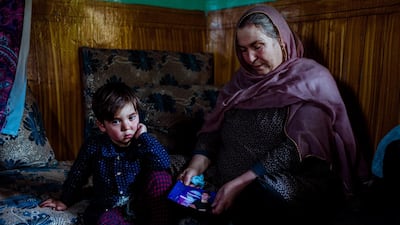National identity cards in Afghanistan will carry a person's mother’s name alongside that of the father following the latest decree signed into law by Afghan President Ashraf Ghani.
The move comes after years of campaigning by Afghan women seeking greater rights for their children. Until recently, Afghans have only been identified by their father’s name on most government documents, creating legal and bureaucratic hurdles for Afghan women to claim legal rights over their children.
In a deeply patriarchal society such as Afghanistan, even mentioning the names of women of the household can be seen as dishonourable.
As a result, identities of mothers are often not mentioned on government documents, and can lead to severe discrimination especially for single women and widows who are unable to prove their relation with their own children.
Among them is Farzana Paigham, 29, a single mother of three from Aybak city in the northern province of Samangan. Farzana’s husband suffered from drug addiction issues for many years, and abandoned the family while the kids were still young.
"I raised my children without my husband for many years, and being a single mother in Afghanistan is like swallowing poison. There is so much judgement and gossip," she told The National.
But it got worse when Paigham tried to enrol two of her daughters in school which required getting national ID cards. “There are no documents that show me as their parent so I can’t get their IDs,” Ms Paigham said.
“I tried explaining to the officials that I am the only parent but they treated me badly. My eldest is nine-years-old and she still doesn’t go to school,” she said.
But the new law gives her hope. Farzana and her sister Basira Paigham, who participated in the ‘Where Is My Name?’ campaign that started four years ago by Afghan women seeking legal rights, are now celebrating the move.
“Afghanistan has many women who are widowed or divorced and inclusion of mother’s names on tazkiras will pave the ground to remove some of the challenges they face,” Ms Paigham, who works as a civil activist, said.
“First of all, this will allow mothers to prove that they are the legal parent to their child during judicial processes. Secondly, they can process bureaucratic and official issues on behalf of the children, so no child goes through what Farzana’s kids have suffered,” she said.
Many conservative Afghans have already objected to this move calling it “unislamic” and against Afghan culture.
However, many Afghan religious scholars have also come out in solidarity with women, and against those protesting the law.
“Nowhere is it mentioned [in the Quran] that you can’t write a mother’s name in a legal document. On the contrary, the Quran is full of references of mothers such as Mariam, Prophet Esa’s mother,” said Mohammad Khalid Haidari, a religious scholar and author in Kabul.
Despite the backlash, Afghan women and activists rejoiced in this recent victory. The ongoing negotiations with the Taliban in Qatar have raised concerns among many over the future of women’s freedoms. The insurgent group was known for its extremist laws and policies that severely restricted women’s rights during their regime in the late 1990s.
“This is not just about having our names on the Tazkira, but providing support to the women. This is least a woman deserves, to her identity associated with her child,” said 29-year-old Hadia Armaghan, mother of two, and the head of department at Afghan Independent Human Rights Commission in the north.
Armaghan joined the campaign after witnessing many cases where women struggled to prove to the Afghan bureaucracy their relation to their children.
“Just a few weeks ago my friend couldn’t obtain the passports of her son because she isn’t listed as a parent on any document. Officials asked to present the father or bring an uncle to prove her maternal relation to her own son,” she said, the outrage evident in her voice.
“I am hopeful this law will be the first step toward many challenges we face when it comes to our identity. In the least, it will allow mothers to travel with her children by themselves,” she said.

